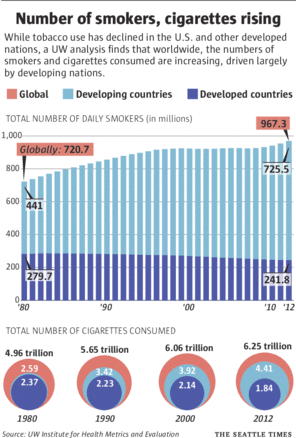If
you ask a number of people who smoke i.e. teenagers and adults, it is amazing
how many, out of ignorance think that there are no effects of smoking on their
bodies until they reach middle age. However, the many serious & harmful
effects of smoking occur much sooner than we think. In fact, smoking has
numerous immediate health effects on the brain and on the respiratory,
cardiovascular, gastrointestinal, immune and metabolic systems. While these
immediate effects do not all produce noticeable symptoms, most begin to damage
the body with the first cigarette sometimes irreversibly – and rapidly produce
serious medical conditions and health consequences.
As
recent studies show a marked increase in the global number of smokers with developing
countries providing the bulk of these smokers, the time to ACT by putting in
place comprehensive tobacco-use legislation is NOW!.
In this post, we would like to briefly review certain tobacco control policy acts in the
21st century, with focus on the impact of specific interventions on
tobacco use in four countries.
Russia
On June 1, 2013, Russia banned smoking in public areas - airports and train stations, schools and hospitals, among other public spots. Tobacco ads were also vanished from streets and as such won’t be featured in Russian movies. It was reported that after this move, half of its citizens that smoked actually stopped and an estimated 200,000 deaths annually will be prevented owing to the new legislation being enforced.
On June 1, 2013, Russia banned smoking in public areas - airports and train stations, schools and hospitals, among other public spots. Tobacco ads were also vanished from streets and as such won’t be featured in Russian movies. It was reported that after this move, half of its citizens that smoked actually stopped and an estimated 200,000 deaths annually will be prevented owing to the new legislation being enforced.
Ireland
Was the first nation to introduce a country-wide
workplace smoking ban in March 2004 on smoking in enclosed workplaces. This new
ban was built onto the 1988 sanctions against cigarette smoking in many public
buildings and on transportation systems. Since then, other members of the European Union have
followed Ireland's good example leading to strong anti-tobacco laws in place
across Europe with proper enforcement taking place.
It was recorded in 2005 that the number of people
with respiratory issues dropped by 17% with 80% of smokers saying that the ban
encouraged them to quit smoking. New
research on the effect of the 2004 legislation has found double-digit drops in heart disease
and strokes rates.
Meanwhile
in a radical move, further legislation banning smoking in private or commercial
vehicles carrying children cars has been introduced. Arguing this is a human rights issue, the
Children's Health Protection bill was enacted in January and came into force in
July 2013.
India
While legislation to ban smoking was passed in 2003, the guidelines were not solidified until Oct. 2, 2008, which incidentally is the birthday of nonsmoker & global icon Mohandas Gandhi. At the time, India was home to 120 million smokers — 900,000 of whom were dying each year from tobacco-related illnesses — and earlier efforts to curb the habit had proved ineffective owing to inconsistent enforcement.
While legislation to ban smoking was passed in 2003, the guidelines were not solidified until Oct. 2, 2008, which incidentally is the birthday of nonsmoker & global icon Mohandas Gandhi. At the time, India was home to 120 million smokers — 900,000 of whom were dying each year from tobacco-related illnesses — and earlier efforts to curb the habit had proved ineffective owing to inconsistent enforcement.
In
2007, strong advocacy campaigns by civil society groups was key in pushing for
the implementation of the 2003 Cigarettes and Other Tobacco Products Act (COTPA)
in Chandigarh. Working with the local
administration, Chandigarh became India's first smoke-free city via active
enforcement of existing laws so they are not just 'paper laws'.
Since
then, over fifteen other cities like Chennai and including popular hill resort,
Shimla have attained the smoke-free status. In July 2013, Himachal Pradesh
became the first 'smoke-free' state in India. For the 2013-14 budget, the state
has doubled taxes on tobacco products and imposed VAT as well to discourage
sales.
U.S.
Like the majority of the world, the U.S. does not have a nationwide smoking ban. However, local and state authorities legislate tobacco use in their domain. Therefore to protect minors, the tobacco-use age limit is set at 18years as the statistics show a higher percentage of citizens who smoke are between the ages of 18 to 24.
Like the majority of the world, the U.S. does not have a nationwide smoking ban. However, local and state authorities legislate tobacco use in their domain. Therefore to protect minors, the tobacco-use age limit is set at 18years as the statistics show a higher percentage of citizens who smoke are between the ages of 18 to 24.
In
2013, New York City & Hawaii County introduced new measures raising the
tobacco-use age to 21years. Legislatures in three other states Vermont,
Maryland, Utah had introduced similar measure while these measures are also
currently under consideration by lawmakers in Colorado, Texas, Hawaii, New
Jersey, Oregon, New York and Washington, D.C.
Schools
like George Washington University have further gone to earmark a ban on smoking
within 25 ft. of all university-owned public spaces towards achieving a
smoke-free zone.
........................................................................................................................................
The
recent move by the lawmakers in Lagos state passing a law prohibiting smoking
in public places in the state is commendable. As the nation's economic hub, leading
the fight in such a critical matter of public health & safety is vital to
sustaining the health of her working population. However, similar initiatives
need to be brought to fruition across the other thirty-five states while
enforcing these laws is essential for the attainment of a smoke-free Nigeria. This is because ACTION speaks louder than WORDS as this is the best medium to see concrete improvement in controlling the use of tobacco and its products in the country.
Ongoing
efforts in the National Assembly on tobacco control laws need to be
consolidated with the proper laws passed at legislative & executive levels
without delay. This is crucial to Nigeria's economic well-being and the health of
all her citizens.
Join
us in making this strong appeal for the National Assembly to pass this bill,
follow us on twitter, add your voice by visiting our facebook page, like our
post, drop your comments and share widely with others. Together we can
make the change that we all desire.
- Twitter: Follow @TobaccoCtrl
- Facebook: Visit and like Tobaccoctrl
- Google Plus: add Tobaccoctrl to your circle
- 2go: add Tobaccoctrl
- 2go: add Tobaccoctrl




